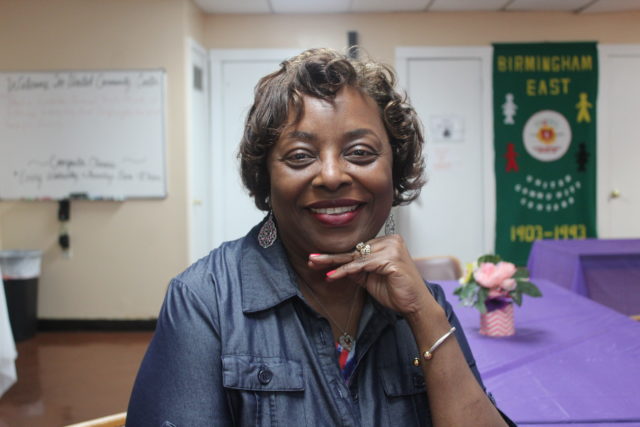
By Erica Wright
The Birmingham Times
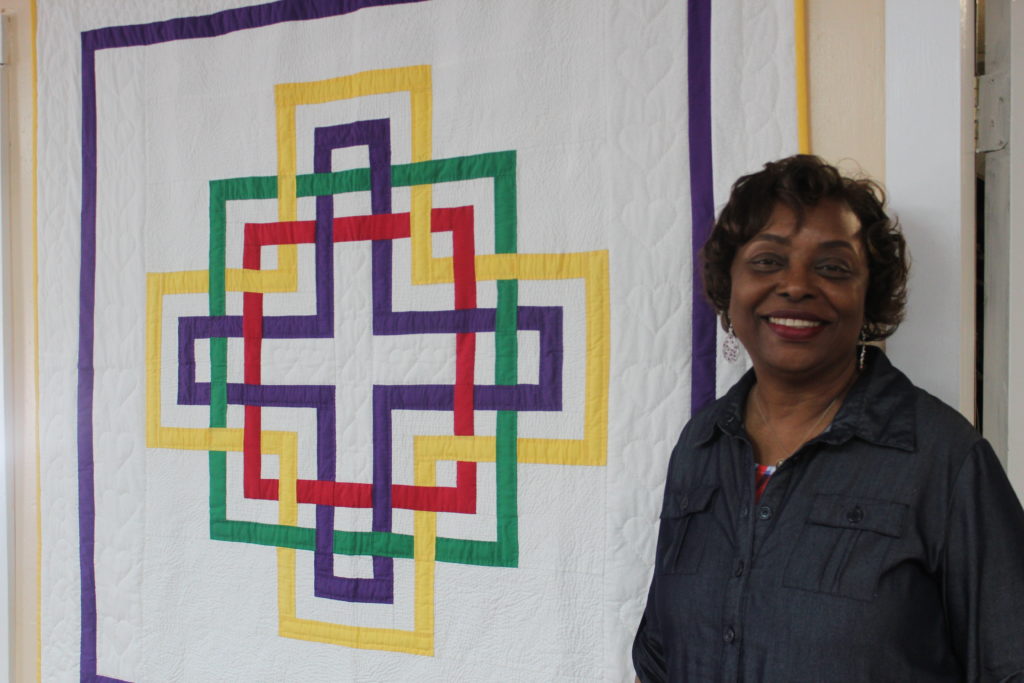
For Theresa McGhee Johnson, quilting is a family business that dates back to when she was being raised by her grandmother in Birmingham.
“[My grandmother] taught all of her grandchildren how to quilt and help her because she used to make quilts for people in the community. We would go out and sell them,” said Johnson, founder of the Riley Center Quilters, who meet in Birmingham’s Southwest community every Tuesday from 4 to 7 p.m.
Just as her grandmother taught her, Johnson teaches her family members.
“My granddaughter, Jada, is 16, and I’ve been teaching her how to quilt since she was about 8 or 9; she has made two quilts. My 11-year-old grandson, George, knows how to put stuff together to make a quilt, as well, because they’re always watching me, and they’re always trying to help,” she said.
“One of my daughters, after she retired from Birmingham City Schools, started coming to the class and has completed a queen-size quilt.”
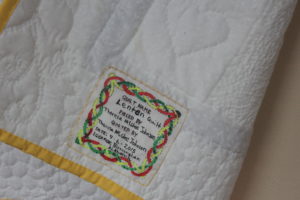
Johnson, 65, teaches not only her family but also fellow community members. As executive director of the Riley Center, she founded a group for quilters in the 1990s; it began with just a few people and now has 25 members.
Since organizing her group Johnson has made more than 190 quilts, 60 of which she calls “UFOs,” or unfinished objects. Her finished quilts have been on display at the Birmingham Public Library in downtown Birmingham, at Alabama State University in Montgomery, and at the Guiding Light Church in Irondale. She has also sent quilts to Japan through the Sister Cities program with the Birmingham Quilters Guild.
Learning the Basics
Johnson grew up in the Riley-Travelick community, where she, her siblings, and her cousins were raised by their grandmother, Bertha Mae McGhee. Johnson was 5 years old when her mother relocated to New York for a job opportunity. Johnson’s grandmother was a housewife, but she made quilts for people in their neighborhood to make some extra money.
“At that time in the 1950s, we had a quilting shop in our home, where the neighbors would come in and the ladies would work together and make quilts,”
Johnson recalled. “We made the [quilts] and sold them to other people in the neighborhood and anybody [else] who wanted them. … My grandmother also taught some of the neighborhood people how to quilt.”
When she first started quilting, Johnson learned the basics. She
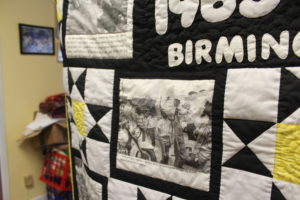
helped her grandmother by putting thread through a needle, and then she began sorting out materials and piecing them together.
“We would sit around the frame and then sew on it,” she said. “I made the stitches on the quilt, and it was enjoyable because I had a chance to sit around and listen to the older ladies talk. They were always laughing and singing and just having a good time.”
When Johnson became more proficient, she and her grandmother would make quilts for people at their church, for their neighbors, and even for when babies were born. Johnson helped while she was a student at Wenonah High School and Lawson State Community College (LSCC). After completing her studies, she married her high school sweetheart, Melvin, and stopped quilting to focus on her family.
Starting Again
About 20 years went by before Johnson made another quilt. By that time, she and her husband had three daughters: Latisha, Jacynthia, and Melba. When her oldest, Latisha, was preparing for college at Alabama State University, Johnson wanted her to take along something special from home.
“I started quilting again in the early 1990s, … and I made sure she had a quilt to take [to school],” she said. “It had been a long time, but it wasn’t difficult for me at all. I started gathering material and got my frame, and it just came back like it never left. It was just a gift, and I knew if I finished it she would be taking something that I made with her and, while she was away at college, she could wrap herself in it if she didn’t have anything else. That’s the way I looked at it, as giving her something from the heart.”
At the time she made the going-away gift for her daughter, Johnson was a program coordinator at the Riley Center. When she completed the quilt, she showed it to some of the seniors who came to the center. They were intrigued.
“The ladies wanted to do something different,” Johnson said. “They had been knitting or making dresses, but when they saw my quilt, it sparked an interest in them. They would say, ‘We used to do that when we were little’ or ‘Mama taught us how to do that,’ things like that. But they wanted to do it better.
“A few of us got together and started doing [quilts] as projects to make money for the senior citizen and after-school programs; we would raffle off quilts. That’s how we started with the class, because I was knowledgeable, and they liked the way I stitched.”
Sharing a Passion
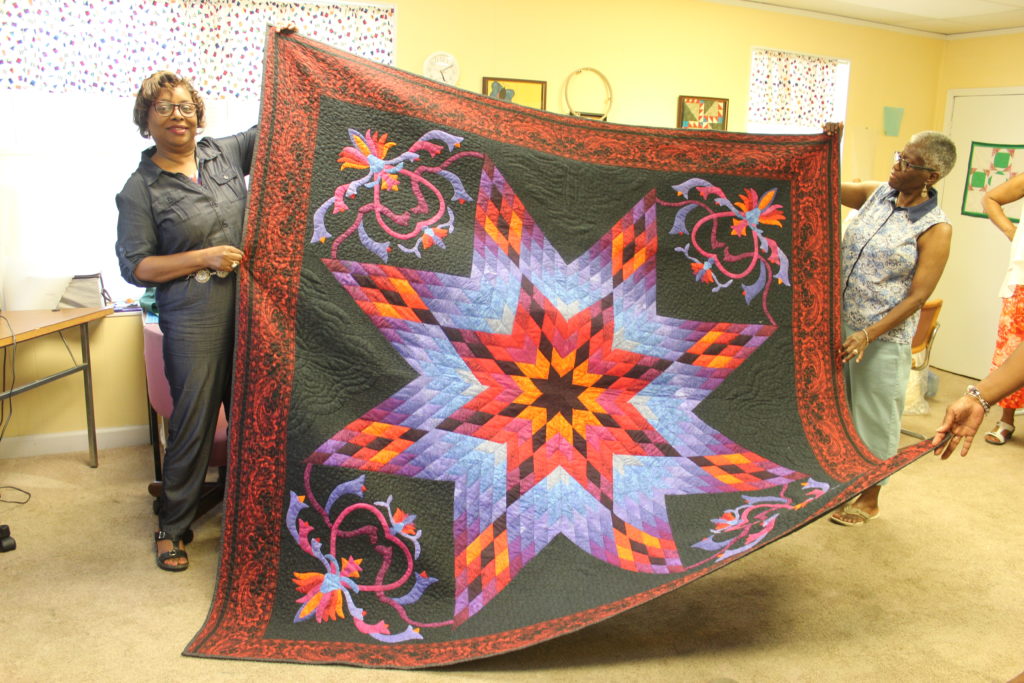
Johnson, who has been a member of the Birmingham Quilters Guild since 2006, has no problem sharing her quilting skills.
“It’s important for me to pass that down because … it calms you down and makes you stay focused. [Also], it is something that pleases you when you’re doing it. I believe that is important, and that’s why I love teaching the art of quilting. It needs to be passed on. My oldest student now is like 87 years old, but it’s important to pass on from generation to generation.”
Of the nearly 200 quilts that she’s made over the past two decades her favorite is one with a lone star.
“It was a challenge to make because of the lone star and all the different techniques of having to make it like applique and hand sewing it,” she said. “I sewed it by hand and I also appliqued the flowers, so it was a project that took me a year to make but I liked it because it was a challenge and something I had never tried before.”
‘Good for the Soul’
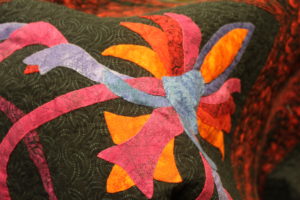
Quilting is an important part of Johnson’s life, and she will continue to quilt for as long as she can, she said.
“Starting this club and quilting have had a great impact on me because I see the progress of the quilters. I’ve seen the progress of children and their attitudes in the process of making a quilt,” Johnson said. “It has helped me calm down, too. When I started, my children were going off to college and I had nothing to do. I went to the doctor and told him I need something to do. He told me to pick up a hobby. Then I remembered that I knew how to quilt, and that’s how I started here.
“When I was younger, I hated doing it because my grandma made us do it. But when I started doing it for my daughter, the calmness came, and I kept seeing how pretty it was. [Quilting] is just good for the mind and good for the soul.”
-This post was updated on October, 11, 2018 at 3:05 p.m. to correct that the Riley Center is in the Southwest community of Birmingham and not West End.




